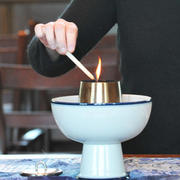
Spiritual practice can take many forms, whether it be accompaniment, multireligious encounter, meditation, or even climate activism and civil disobedience.
An ongoing discussion series at HDS led by students allows them to share some of their experiences with these different and diverse practices. The hour-long informal lunchtime presentations, titled "Practicing Divinity: HDS Students Sharing Wisdom and Spiritual Practice," are co-sponsored by the HDS Student Association and the Office of Religious and Spiritual Life.
"These types of programs open up our abilities to connect what we do academically to the things that matter to us—to our spiritual and religious identities—in a way that isn’t necessarily facilitated in an academic classroom context," said Usra Ghazi, MTS candidate and president of the Student Association. "They allow us to connect more deeply on the issues that matter to us that we study, but also across religious difference."
Ghazi is one of the students who will lead a discussion this semester. Her talk on October 21 will focus on multireligious encounter as a spiritual practice. The theme comes in part from Ghazi's experience growing up. While in high school, Ghazi, a Muslim, was asked what the Qur'an says about hospitality. It was something she hadn't thought of before, so she went home and scoured her Sunday school books and found it "everywhere."
That experience gave Ghazi "new eyes with which to read my own religious texts," she said. "Interfaith encounters or multifaith engagement is a really rich sort of laboratory in which to test out the things that you actually believe, the things you've been taught, or the ideas or beliefs that are still churning and still sort of growing and evolving. It forces one to take ownership of their spiritual or religious identity."
During the first event in the series on September 16, "Climate Activism and Civil Disobedience as a Spiritual Practice," Tim DeChristopher, master of divinity degree candidate, told a crowd gathered in the Common Room of the Center for the Study of World Religions that civil disobedience can be done in a spiritual way, as long as the intention is there. He called it both a centering practice that grounds people as individuals and also an uplifting practice that interconnects people and the living world.
"On the one hand, civil disobedience is a spiritual practice that I think uplifts the particularity of ourselves, but, at the same time, it does something very different in that it also uplifts the universality of ourselves and connects us to the much bigger interdependent web of life, and we find ourselves not just as an isolated individual that has that important particularity, but also this much bigger global self," said DeChristopher, a climate activist.
Reflecting on her trip to Palestine this past summer, MDiv candidate Leandra Lambert spoke October 2 on accompaniment as a spiritual practice, and Nancy Chu, also an MDiv candidate, will speak November 13 on meditation as a spiritual practice.
Ghazi called these types of student-led discussions a "rare gem" because, she said, the HDS community hears so often from faculty and academics from around the world that come to speak at the School.
"My hope is that these types of conversations happen outside of the context of the Divinity School and that these events make conversations about spirituality and religious identity more approachable," said Ghazi.
—by Michael Naughton
